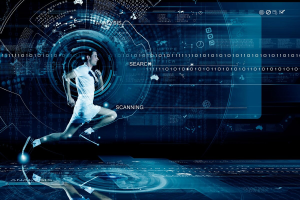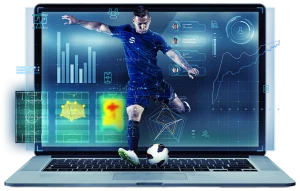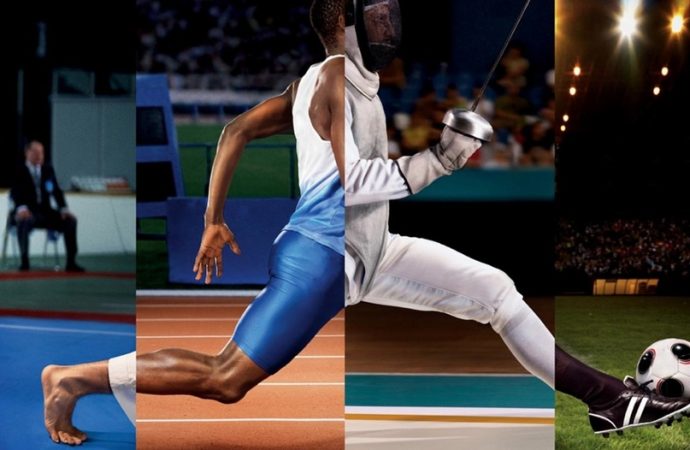Artificial Intelligence (AI) is no longer just a buzzword in tech circles—it’s a game-changer influencing countless industries, including professional sports. From enhancing athlete performance to transforming fan engagement, AI is shaping how we experience and analyze sports on every level. This blog explores the ways AI is revolutionizing the sports industry, showcasing how it helps
Artificial Intelligence (AI) is no longer just a buzzword in tech circles—it’s a game-changer influencing countless industries, including professional sports. From enhancing athlete performance to transforming fan engagement, AI is shaping how we experience and analyze sports on every level.
This blog explores the ways AI is revolutionizing the sports industry, showcasing how it helps athletes train smarter, equips coaches with tactical insights, and brings fans closer to the action. By the end of this article, you’ll not only understand how professional sports are adapting to this technological evolution but also the exciting possibilities AI holds for the future of sports technology.
AI in Athlete Training and Performance Analysis

Image by Yandex.com
Personalized Training Programs
Training smarter, not harder, has become the mantra for many professional athletes, thanks to AI. Using advanced analytics and machine learning algorithms, AI can create personalized training programs based on each athlete’s unique physiology, performance data, and goals.
Wearable technology like fitness trackers and smart sensors plays a critical role here. Devices from brands like WHOOP and Catapult collect real-time data on metrics like heart rate, muscle fatigue, and sleep patterns. AI then analyzes this data to suggest tailored workouts and recovery plans. For instance, a basketball player looking to improve endurance might receive AI-generated recommendations to incorporate interval training into their routine.
Injury Prevention
Professional athletes face immense physical demands, making injury prevention a top priority. AI helps medical teams and trainers identify athletes who are at risk of injuries before they occur. By analyzing historical injury records and motion capture data, algorithms can detect patterns associated with overuse or improper movements.
Case Study: Major League Baseball’s Los Angeles Dodgers use AI-driven products like Kitman Labs to monitor player health. By interpreting movement patterns, Kitman Labs predicts the likelihood of injuries, allowing trainers to make preemptive adjustments to an athlete’s routine.
Performance Analysis
Athlete performance analysis has always been data-intensive. Before AI, coaches relied heavily on manual video reviews to analyze plays. Now, AI-powered tools like Hudl and SkillCorner offer more accurate performance insights in significantly less time. These tools break down game footage into measurable statistics, pinpointing areas for improvement while giving a clearer picture of an athlete’s capabilities.
AI in Game Strategy and Analytics
Predicting Game Outcomes
AI sports analytics is reshaping how teams strategize for games. By processing massive datasets, AI tools assess player statistics, environmental factors, and opposition strategies to predict game outcomes with remarkable accuracy. This predictive analysis has become essential for sports betting companies, coaches, and team owners.
For example, IBM Watson uses AI to analyze tennis match data and provide real-time predictions during tournaments like Wimbledon. Similarly, NFL teams are leveraging advanced scouting tools, such as Zebra Technologies, to predict how opposing players will behave during specific game scenarios.
Optimizing Coaching Decisions

Image by Yandex.com
Coaches act as decision-makers both before and during games, and AI helps to optimize their strategies. Real-time analytics platforms like Second Spectrum provide data on player tendencies, ball trajectories, and positional advantages during matches. Coaches can use this data to tweak their game strategy on the fly—whether it’s changing a player’s position or altering defensive schemes.
Scouting for Talent
Player recruitment just got a tech makeover. AI solutions like Wyscout and StatsBomb analyze thousands of hours of game footage to shortlist potential recruits based on individualized performance metrics. These tools reduce bias in traditional scouting processes while widening the talent pool for teams.
AI in Fan Engagement and Experience
AI and Personalized Fan Experiences
The days of generic fan interactions are behind us. AI algorithms are now able to create personalized content for viewers based on their preferences and behavior. For example, platforms like Microsoft Azure and IBM AI curate highlights tailored to each fan—whether they’re interested in a player’s best dunks or a team’s defensive plays.
Virtual Assistants and Chatbots
AI-powered chatbots, like those used by the NBA on Facebook Messenger, provide instant answers to fan queries about scores, stats, and schedules. These virtual assistants ensure fans stay engaged even during off-seasons or downtime in games.
Immersive Fan Experiences
Some stadiums are leveraging augmented reality (AR) and virtual reality (VR) to bring fans even closer to the action. The Sacramento Kings, for instance, use VR live-streaming for fans who want to experience courtside views from the comfort of their home.
Even ticket sales are getting smarter. AI platforms optimize pricing and availability, ensuring fans get the best value while teams maximize ticket revenue.
Future Trends and Implications

Image by Yandex.com
Emerging Trends
The adoption of AI in professional sports is only accelerating. Here are some exciting trends we can expect in the near future:
- AI referees and officiating tools for more accurate foul and offside detection.
- Augmented coaching assistants capable of suggesting tactical changes during live games.
- Biometric fan access for a faster, more secure stadium entry experience.
Challenges and Opportunities
While the benefits of AI in sports are undeniable, challenges remain. One major concern is data privacy—both for athletes and fans. Organizations must ensure strict ethical standards in data collection and usage. Similarly, reliance on AI for decision-making could diminish the human element that makes sports unpredictable and exciting.
However, these challenges also present opportunities. By navigating these barriers thoughtfully, teams and organizations have the chance to set new benchmarks for transparency and innovation in the industry.
The Future of AI in Sports is Here
Artificial Intelligence has undoubtedly become a vital component of professional sports. From enhancing player performance to creating unforgettable fan experiences, its impact is broad, revolutionary, and still unfolding.
The integration of AI sports analytics and technologies doesn’t just improve how games are played or watched—it redefines the entire sports ecosystem. And as advancements in sports technology continue, one thing is clear: the synergy between AI and sports is only just beginning.
For readers passionate about the intersection of sports and technology, now is the time to engage with these developments and explore their potential. Stay curious, stay involved, and watch as AI takes the sports industry to new heights.
















